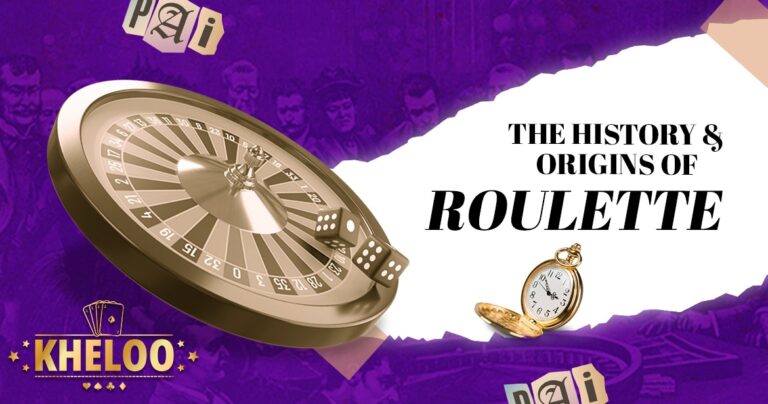In the universe of casino gaming, there are a couple of games that are more famous and broadly enjoyed as compared to roulette. The portion of the love for the game is its alluring simplicity; spin the wheel and pray that Lady Luck is smiling down on you. It’s this uncertainty and thrill that has fuelled the fame of the game throughout the past 2 centuries.
From the noble gambling parlors of revolution-era Paris to the harsh gaming halls of Industrial-era New Orleans, roulette has found charm far and wide as a staple of actual cash gaming. But what are the origins of roulette, and how did it evolve to become one of the world’s most appreciated casino games? Read on to discover the history of roulette.
The Genesis of Roulette
The beginning of roulette is tough to verify, but there is a common consensus on how the game was initially conceived. It’s believed that the celebrated French mathematician Blaise Pascal accidentally invented the roulette wheel back in 1655, as part of this pursuit to produce the world’s foremost perpetual motion machine. While his calculated mission was never fulfilled, he did manage to produce a weighted wheel that would go on to become the core of the 18th-century Paris gambling scene.
Also Read: Crazy Time Casino Review
Roulette Takes Europe by Storm
It’s believed that the game of roulette as we know it currently has been played at least since 1796 in Paris, as it was classified in some detail in a contemporary French novel known as La Roulette, ou Histoire d’un Joueur by Jacques Lablee. In the initial years of roulette, the game was very much a game for the upper class of France. The final generation of aristocrats in pre-revolutionary Paris would gather in elaborate gaming parlors of the Faubourg Saint-Honore, anticipating to win astonishing fortunes from a spin of the wheel.
While the revolution put a stop to this activity, the fame of roulette had already escalated, with affluent German spa towns such as Bad Homburg providing the game to major league clientele during the onset of the 19th century. From here, Francois Blanc, the Frenchman who managed the casino in Bad Homburg, took his roulette wheel to Monte Carlo. It then started the following leg of its venture.
It was in Monte Carlo where Pascal’s version of roulette took on a new appearance, with the development of French roulette. Based on legend, the initial Zero pocket was included in the wheel by Francois Blanc at the request of Charles lll, the King of Monaco. This is since Charles had hoped to elevate his sickly royal coffers with cash from his new casino, and required a house edge to improve his prospects.
The zero pocket and the popular roulette house edge immediately became a lasting fixture of the game. It’s also worth heeding that, as the game spread across Europe, the French roulette wheel became and stayed the leading one. However, a type of European roulette has evolved that is separate from French roulette in one crucial method – the La Partage rule. In French roulette solely, La Partage signifies that, if the ball falls in the zero pocket, you can win half of your initial stake back.
American Roulette is Brought Forth
It wasn’t long till roulette made its way stateside, and the roulette form renowned as American roulette was brought forth. It’s believed that the foremost references to roulette in North America were in French Quebec and descriptions of the game being played in the rowdy gaming halls of 19th-century New Orleans.
The foremost version of American roulette has 3 zero pockets, instead of the currency 2, with the 3rd pocket just consisting of a picture of an American eagle.
This additional pocket gave the house an absurd edge of 12.9%, which was disliked by bettors that it was swiftly scrapped. As roulette grew out of the gaming halls of New Orleans and made its path west through the steamboat casinos on the Mississippi, a new sort of roulette took birth that would come to be the version of American roulette that we know and play today.
In this version, there are 2 zero pockets instead of one as there are in European and French roulette. Although this still offers the house a greater edge than in European roulette at 5.26% instead of 2.7%, it’s the version that stuck and that gamblers proceed to prefer.
Before long, American roulette was a mainstay of the gambling universe and would swiftly feature in the initial casinos to be constructed in Las Vegas during the onset of the 20th century.
A New Age of Digital Roulette
Currently, roulette is more accessible and more famous than ever before. Following the introduction of the very first online casino back in 1996, the online casino industry has blasted into a multi-billion-dollar a year sector.
Today, all kinds of roulette, from American roulette to French roulette to lightning roulette and double roulette can all be played in one place right from the comfort of your couch.
These days, as online players search for increasingly immersive experiences, the most cutting-edge digital casinos are utilizing technology to go back to basics. Thanks to premium and lightning-fast livestream technology, numerous casinos now offer live roulette games.
These permit players from anywhere in the globe to play roulette on an actual wheel with an actual live casino dealer, offering the Las Vegas experience right to your home. As digital casinos proceed to expand in fame, it seems clear that roulette is here for good.

FAQs
- What is the beginning of roulette?
Roulette’s history goes back to centuries ago. It is believed that a celebrated French mathematician Blaise Pascal accidentally invented the roulette wheel back in 1655. - How did the European roulette come to be?
Even though people think that French roulette is the sole variant devised by Frenchmen, European roulette was also invented by a couple of Frenchies – Louis and Francois Blanc. They took out the double zero pocket and gave European roulette its contemporary look. - What makes Online roulette a famous choice among bettors?
With the accessibility and rise of technology, the casino sector is greatly affected and online gaming venues have begun popping up in throngs. Playing online roulette is more simple and you have all roulette versions accessible on the majority of websites. It’s less distracting, you have more time, and the stress levels can be significantly lower. - Which are the finest roulette sites for enthusiasts of the Table game?
The finest online casino that offers roulette games will stick out with a decent variety of both live dealer roulette as well as the RNG versions. Also, they will offer distinctive table limits to appeal to both conservative players as well as high players. - What are the advantages and disadvantages of the live casino roulette?
Playing roulette at a live online casino is extremely satisfying due to its excellent realism and authenticity. If you wish for an actual casino experience, you should give live roulette a hand. A possible disadvantage is the lack of demo versions. For additional insights, we encourage you to check out the Kheloo online casino platform where you can play live online roulette.




Comments are closed.